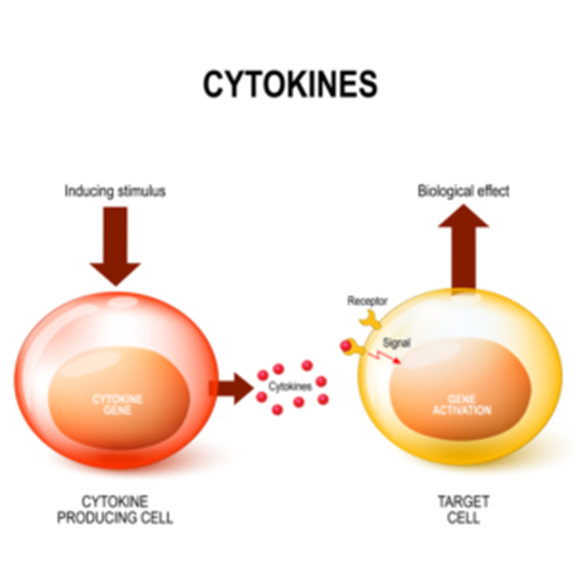by Suzy Cohen

We’ve all been hearing about something called a cytokine storm, and how elevations in various cytokines contributes to fatal outcomes with COVID-19. It’s not the pathogen per se, we can and do coexist with many organisms. It’s the flooding in the body of cytokines in response to the pathogen that causes symptoms and complications.
The role of cytokines has been studied for decades because when they fall out of balance, you see exacerbation in symptoms, and this occurs for all diseases. Cytokines have a normal reference range so anything above or below the “normal” may produce health challenges.
Cytokines are not new, you hear of them frequently because we now understand that managing them is the key to staying healthy. The word “cytokine” refers to a protein that you make in your body. Cytokines are created by certain immune (and non-immune) cells and each protein has its own individual effect on your immune system. Some cytokines are known to stimulate the immune system to make it fight harder, while others slacken it to prevent self-directed autoimmune assault. There are various types of cytokine classifications too. We have lymphokines, chemokines, interleukins (IL), interferons and tumor necrosis factor (TNF). I don’t want to get too far away from the topic at hand which is fluvoxamine. So let me just tell you outright, that this drug is known to reduce certain cytokines and the strange part of all this, is that its real claim to fame is for Obsessive Compulsive Disorder!
Noodle that for a minute! The the famous OCD drug reduces some cytokines, and therefore might help people with COVID and long-haulers. It can reduce the amount of histamine that gets dumped from mast cells. Because fluvoxamine reduces serotonin from concentrating in platelets it can help reduce blood clot formation. This was noticed in patients taking the drug all the way back in 2011, and they had reduced risk of clot formation. As you probably know, the coagulation pathway is something that we must focus on in people who have had COVID.
Another biomarker to check status is D-dimer, you can read about that HERE in my other article,Understanding D-dimer and 10 Strategies to Reduce It.
I don’t want to get too detailed right now, I just want you to realize it works along important pathways and may be an adjunctive treatment in long-haulers patients, who are supervised and treated by a qualified doctor. But why stop there? It could reduce cytokines in many other diseases. This is absolutely 100 percent considered “off-label” usage. But again, that’s because the drug’s labeling is for OCD and depression. The off-label use is for cytokines. It’s not typically prescribed for cytokine storms, and that’s probably because of the side effect profile which I will get to momentarily. First a little background…
Fluvoxamine is an orally-administered medication that was invented in Belgium in 1983 at a pharmaceutical company, and then later it became FDA approved here in the USA as Luvox in 1994.
It raises serotonin in the human body like the SSRI drugs, but it is not FDA approved for the treatment of any infection, not even respiratory ones. The Lancet published their findings on this topic from the TOGETHER Trial which just came out in January 2022, and concluded that fluvoxamine could reduce mortality and hospitalizations.
But as I mentioned, it could cause serious side effects, the most challenging of which are seizures, cardiac problems due to low sodium (hyponatremia), suicidal ideation and insomnia. There are others of course, but these are most challenging to deal with. Furthermore, the medication interacts with a lot of medications, including popular ones such as warfarin, lithium, antidepressants and stimulants for ADHD.
Nevertheless, many infectious disease specialists and neurologists capitalize on fluvoxamine’s lesser known (off-label) benefit to reduce cytokines! If you’re interested in other off-label uses for medications, this is a fascinating read: Curious and Unexpected Off-Label Drug Uses.
The medication can reduce cytokines! See this ARTICLE where they say it “normalizes striata neuronal inflammatory cytokine activity.” This was an animal model, not a human study and it means it has a potential therapeutic role for people with Parkinson’s disease.
If you’d like more information take a moment to read this 2021 PAPER which discusses the mechanisms of Fluvoxamine. Fluvoxamine is not for everyone, I don’t want to make it sound like it’s a panacea for all types of pain syndromes, cytokine imbalances or neurological disorders. But for some people, it could come in handy, especially at the lower doses which produce fewer side effects than high dosing. For more information about this medication, speak to your pharmacist and physician, and visit the Mayo Clinic’s website for general data HERE.
